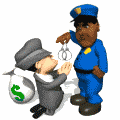|
There are two exceptions to fixed interest CDs. One type of variable rate CD is called a  "multi-step" or "bonus rate" CD where the rate you earn goes up or down according to a pre-set schedule. "multi-step" or "bonus rate" CD where the rate you earn goes up or down according to a pre-set schedule.
Under the terms of these CDs, if interest rates go up, the interest paid on your CD goes up too, but usually only once per year.
You have to be careful with variable rate CDs because they can sometimes work the other way. Your interest rate can go down with some variable rate CDs that pay interest rates based on the performance of a market index, such as the S&P 500 or the Dow Jones Industrial Average
 The other exception is a callable CD. In this case, the issuing brokerage, credit union or bank has the right to terminate or "call" your Certificate if interest rates fall to a point where they are losing too much money by paying you the agreed interest. The other exception is a callable CD. In this case, the issuing brokerage, credit union or bank has the right to terminate or "call" your Certificate if interest rates fall to a point where they are losing too much money by paying you the agreed interest.
The call period reflects when and how often an issuer can call your CD. For example, you can buy a five-year CD with a one-year call period that means the issuer can call the CD after one year if the rates fall. A 24-month CD might have a six-month call.
Only the bank, credit union or brokerage has the right to "call" the Certificate, not the person who buys it. If you’ve invested in a long-term CD and interest rates go up, you’ll be locked in at the lower rate.
When you buy a callable CD, you're taking a risk that the CD will be called and you'll have to reinvest at a lower rate. You should receive a premium (a higher rate of interest) for taking this risk.
This is why it is very important to read and understand the terms of your CD. Make sure you understand the maturity date or the date when you can collect your money. Some CDs have a maturity date of 15-20 years.
|
 A lot of people have been shocked to learn they signed away a large amount of money at a low rate of interest for twenty years after they signed a "one-year non-callable CD," for example. That meant the credit union, bank or broker couldn’t call the CD for one year. It had nothing to do with the CD’s maturity date, which was 20 years. A lot of people have been shocked to learn they signed away a large amount of money at a low rate of interest for twenty years after they signed a "one-year non-callable CD," for example. That meant the credit union, bank or broker couldn’t call the CD for one year. It had nothing to do with the CD’s maturity date, which was 20 years.
You should read the disclosure statement provided when you buy a CD. Confirm your exact interest rate and how you’ll be paid.
 Make sure you also understand the penalty for early withdrawal if you cash in your CD before the maturity date. The penalty can be 3 to 6-month’s interest! Make sure you also understand the penalty for early withdrawal if you cash in your CD before the maturity date. The penalty can be 3 to 6-month’s interest!
In addition to credit unions and banks, brokerage firms (known as deposit brokers) also sell CDs. Brokers typically charge a fee for this service--usually around one percent of the CD’s yield. Be sure to consider all expenses prior to signing up for a CD with the highest stated rate.
 There are many reputable brokerages that sell callable CDs (among other things) and have no intention of defrauding anyone. But unfortunately some deposit brokers aren’t ethical. There are no federal or state licensing requirements for deposit brokers, so anyone can be one. There are many reputable brokerages that sell callable CDs (among other things) and have no intention of defrauding anyone. But unfortunately some deposit brokers aren’t ethical. There are no federal or state licensing requirements for deposit brokers, so anyone can be one.
If someone offers you an above-market rate, be skeptical and ask a lot of questions. You might buy a CD that is actually held by a group of investors (not just you alone), and if something goes wrong and you need your money, you’ll have more trouble getting your money out or selling your portion. The government handles thousands of complaints a year about CDs, many of them sold by deposit brokers.
For more information about CDs, click here.
If you suspect wrong-doing, contact the Securities Regulator for your state or the North American Securities Administrators Association.
See what you learned.
Check out "Verrry 'Interest'ing" |